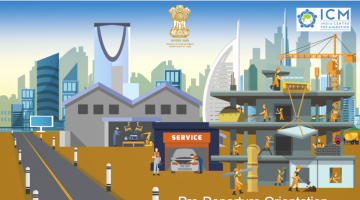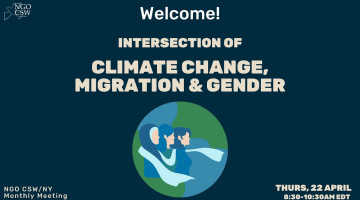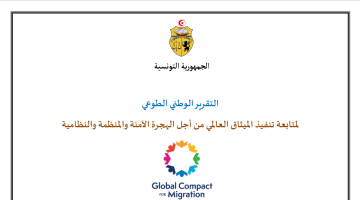Library
- Resource - Guidelines/Toolkits/Manuals
The pre-departure training provides information prior to the migrant’s departure on the workers’ rights and responsibilities; the destination country’s culture, laws and policies; accessing support services and complaints mechanisms; sending money home, and return and reintegration. The curriculum...
SourceInternational Labour Organization (ILO)GCM Objectives
- Resource - Guidelines/Toolkits/Manuals
This booklet from the Ministry of External Affairs in India provides orientation for prospective migrant workers prior to their departure. It includes information about required bureaucratic procedures and tips for safety abroad, as well as remittances.
SourceGovernment of India Overseas Employment Division, Ministry of External AffairsGCM Objectives
- Projects -
EUDiF is the first EU-funded project that works towards fostering an informed, inclusive and impactful diaspora-development ecosystem on a global scale. EUDiF seeks to generate and consolidate knowledge, host dialogue and take action to address the fragmentation of diaspora engagement for...
SourceInternational Centre for migration Policy Development (ICMPD)
- Projects -
The OSCE is committed to addressing the migration phenomenon cross-dimensionally and by capitalizing on the added value it can bring to regional and global solutions. The organization’s key assets include its wide geographical scope, its broad and diverse membership, its norms-setting function and...
SourceOrganization for Security and Co-operation in Europe (OSCE)
- Resource - Platform / Website
The European Migration Network (EMN) is an EU network of migration and asylum experts who work together to provide objective, comparable policy-relevant information and knowledge on emerging issues relating to asylum and migration in Europe. The EMN produces reports, studies and other publications...
SourceEuropean UnionGCM Objectives
- Resource - Platform / Website
The EU Immigration portal presents practical information about coming to work or study in the EU for more than 90 days and on how to join your family in the EU, migrants' rights while they are already in the EU and possibilities for moving from one EU country to another. It provides links to other...
SourceEuropean Union European Commission
- Resource - Platform / Website
This page of the European Web Site on Integration (EWSI) tracks the impact of the global COVID-19 pandemic on migrant communities in a number of key integration areas: extraordinary administrative measures introduced by the Member States, funding opportunities meant to assist the civil society...
SourceEuropean Web Site on Integration (EWSI)
- Resource - Platform / Website
The IOM e-Campus is a free learning platform with online courses and training materials on migration. The e-Campus courses are prepared by experts in topics that converge with migration. Currently there are courses in Spanish, English, French, Italian, Greek and Arabic (the languages offered depend...
SourceInternational Organization for Migration (IOM)
- Projects -
"No borders to equality" aims to identify and learn from the work of organizations addressing the intersection of gender and migration.
In 2020, more than 300 organizations and networks around the globe completed an online survey to provide a profile of the organizations, the characteristics and...
SourceFriedrich-Ebert-Stiftung, Women in Migration Network (WIMN)GCM Objectives
- Projects -
UN Women is implementing the Making Migration Safe for Women programme with the goal of helping to ensure that international norms and standards for protecting and promoting migrant women’s rights are strengthened and that migration is safe for women migrating from, into and through Niger, the first...
SourceUN Women
- Video -
A video on Gender Responsive Migrant Worker Resources Center (MRC) and the One-Roof Integrated Services (LTSA) for Indonesian migrant workers.
SourceInternational Labour Organization (ILO)
- Video -
Discussion on intersections of climate change and gender as a driver for migration and the plight of women on the move.
SourceNGO Committee on the Status of WomenGCM Objectives
- Video -
Web talk by journalist Alice Driver on Gender and Migration, where shares photographies and stories from her most recent investigation at Reynosa (Mexico) and shows the realities created by migration and gender politics and how women and the LGBTQ community navigate the US-Mexico Border Crisis.
SourceUniversity of Innsbruck
- Video -
Web talk by Paola Cyment, Independent Consultant on Gender and Migration and member of Women in Migration Network (WIMN) discusses structural drivers of gender-specific migration, including the relationships between capitalism, patriarchy and migration. and effects of the COVID-19 pandemic
SourceFES Gender Innovation NetworkGCM Objectives
- Resource - Other
Sectoral brief prepared under the gender mainstreaming programme of the European Institute for Gender Equality that highlights that Gender is a crucial variable when looking into the policy area of migration and the lack of a gender perspective in migration, asylum and integration policies can have...
SourceEuropean Institute for Gender Equality (EIGE)GCM Objectives
- Resource - Platform / Website
Links to policy papers, tools, studies and platforms and links by members of the Swiss Agency for Development and Cooperation's Network on Migration.
SourceSDC Network on Migration
- Resource - Other
This article is part of a series of articles by the Global Coalition on Migration and the Friedrich-Ebert-Stiftung on international migration during the COVID-19 pandemic.
SourceFriedrich-Ebert-Stiftung
- Resource - Report
Voluntary National Report for Sudan ahead of the GCM Regional Review for Africa
SourceGovernment of SudanGCM Objectives
- Projects -
The International Placement Services (ZAV) from the Bundesagentur für Arbeit and GIZ have established a project for the placement of qualified nurses with German companies. The project facilitates migration of healthcare personnel from Bosnia and Herzegovina, the Philippines, Tunisia, Indonesia and...
SourceGovernment of Germany Deutsche Gesellschaft für Internationale Zusammenarbeit (GIZ) GmbH
- Resource - Report
Voluntary National Report for Tunisia ahead of the GCM Regional Review for Africa
SourceGovernment of TunisiaGCM Objectives
Pagination
About the Migration Network Hub
What is the Migration Network Hub?
The Hub is a virtual “meeting space” where governments, stakeholders and experts can access and share migration-related information and services. It provides curated content, analysis and information on a variety of topics.
The Hub aims to support UN Member States in the implementation, follow-up and review of the Global Compact for Migration by serving as a repository of existing evidence, practices and initiatives, and facilitating access to knowledge sharing via online discussions, an expert database and demand-driven, tailor-made solutions (launching in 2021).
Submit your content
What content is displayed in the Hub?
The Hub aims to help you find information on migration, ranging from policy briefs and journal articles, existing portals and platforms and what they offer, to infographics and videos. The different types of resources submitted by users undergo peer review by a panel of experts from within the UN and beyond, before being approved for inclusion in the Hub. To provide guidance to users based on findings of the needs assessment, the content is ordered so that more comprehensive and global resources are shown before more specific and regional ones. Know a great resource? Please submit using the links above and your suggestion will be reviewed. Please see the draft criteria for existing practices here.
Apply to join the Peer Review Roster
Content submitted to the Migration Network Hub is first peer reviewed by experts in the field from both the UN and beyond. Applications are welcomed to join the roster on an ongoing basis. Learn more here.
Contact us
We welcome your feedback and suggestions, please contact us
*References to Kosovo shall be understood to be in the context of United Nations Security Council resolution 1244 (1999).
Newsletter
Subscribe to our newsletter.